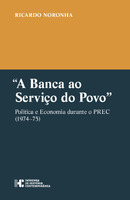"A Banca do Serviço do Povo"
Política e Economia durante o PREC (1974-75)
Abstract
This book deals with the nationalization of the bank sector in the context of the Portuguese revolutionary process of 1974-75. Based on a vast collection of documentary sources and inspired by a set of theoretical tools developed by Mario Tronti, Walter Benjamin and Michel Foucault, it starts with an inescapable interrogation: how could a measure that was not included in the Armed Forces Movement Program and had such considerable implications, both in the short and in the long term, obtained enough support to be included in the Constitution as an irreversible conquest of the working class? The response developed in the following pages establishes an articulation between social conflicts and political economy, identifying it as the centre of gravity of the process that would lead to the nationalization of the bank sector. In this sense, it analyzes the way in which social struggles contributed to a process of cumulative radicalization, initiated at the end of the Estado Novo and which would gain increasing intensity throughout the revolutionary process. At the same time, it seeks to understand why the diagnosis of the economic situation contributed to polarize the political struggle, by mapping the lines of force of a debate that underwent successive declinations and covered different aspects, such as inflation, labour laws or property relations. In a context of economic and revolutionary crisis, the banking sector became a critical point in the capital-labour relation: credit concession would take on decisive importance after 25 April, with labour-unions accusing bankers of pursuing destabilization strategies associated with the practice of "economic sabotage"; in the wake of its nationalization, in turn, government officials, managers and trade-unionists sought to put "the banks at the service of the people", in the context of a brief experience of "socialist transition" that would make its way into the text of the Constitution. The case of the bank sector is therefore a privileged interpretative-key to identify the set of problems and the horizon of possibilities that dominated the historical conjuncture following the 25th of April. This book is a contribution to the maturation of the historiographical field dedicated to the interpretation of the revolutionary process of 1975-75, establishing a critical dialogue with the works that have been produced on the subject over the last years. Este livro ocupa-se da nacionalização da banca no contexto do processo revolucionário português de 1974-75. Baseado num vasto acervo de fontes documentais e inspirado num conjunto de ferramentas teóricas desenvolvidas por Mario Tronti, Walter Benjamin e Michel Foucault, o seu ponto de partida é uma interrogação incontornável: por que razão uma medida que não constava do Programa do Movimento das Forças Armadas e assumia implicações tão consideráveis, a curto e a longo prazo, obteve um apoio suficientemente alargado para ser inscrita na Constituição da República enquanto uma conquista irreversível da classe trabalhadora? A resposta ensaiada ao longo destas páginas estabelece uma articulação entre conflitos sociais e economia política, identificando-a enquanto o centro de gravidade do processo que conduziria à nacionalização da banca. Nesse sentido, analisa o modo como as lutas sociais contribuíram para um processo de radicalização cumulativa iniciado no final do Estado Novo, que ganharia intensidade crescente ao longo do processo revolucionário. Simultaneamente, tenta compreender por que razão o diagnóstico da situação económica contribuiu para polarizar o combate político, cartografando as linhas de força de um debate que conheceu sucessivas declinações e abrangeu aspetos tão diversos como a inflação, a legislação laboral ou as relações de propriedade. Num contexto de crise económica e revolucionária, o setor bancário converteu-se num ponto crítico da relação entre trabalho e capital: a concessão de crédito assumiria uma importância decisiva após o 25 de Abril, com os sindicatos a atribuir aos banqueiros propósitos de desestabilização associados à prática de "sabotagem económica"; na sequência da nacionalização do setor, por sua vez, governantes, gestores e sindicalistas propuseram-se colocar "a banca ao serviço do povo", no contexto de uma breve experiência de "transição socialista" cujo eco se faria sentir no texto da Constituição da República. O caso da banca revela-se assim uma chave interpretativa privilegiada para identificar o elenco de problemas e o horizonte de possibilidades que dominou a conjuntura histórica a seguir ao 25 de Abril. Este livro propõe-se contribuir para o amadurecimento do campo historiográfico dedicado à interpretação do processo revolucionário de 1975-75, estabelecendo um diálogo crítico com os trabalhos de investigação produzidos acerca do tema ao longo dos últimos anos.
Keywords
Nationalizations; Banks; Portuguese Revolution; Social Conflicts; Political Economy; Nacionalizações; Bancos; Revolução Portuguesa; Conflitos Sociais; Economia PolíticaISBN
9789899838888OCN
1100514530Publisher
Imprensa de História ContemporâneaPublisher website
https://imprensa.ihc.fcsh.unl.pt/Publication date and place
2018Classification
Portugal
European history
History and Archaeology
20th century, c 1900 to c 1999
Revolutions, uprisings, rebellions
Public ownership / nationalization


 Download
Download